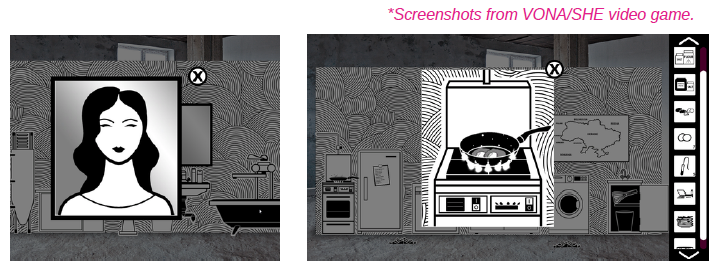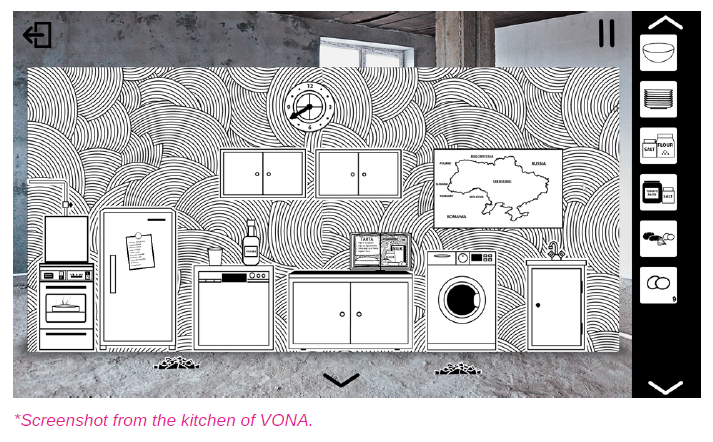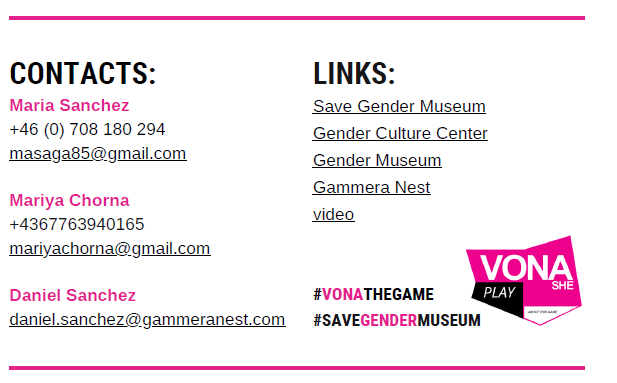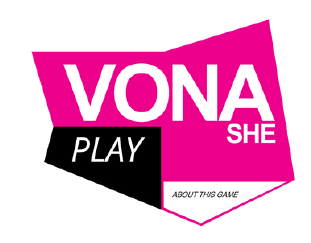3RD MARCH, 2023 – GLOBAL LAUNCH
VONA/SHE is a feminist video game that helps us to escape from heteropatriarchy.
VONA, which means she in Ukrainian, was born from the collaboration between the Spanish studio Gammera Nest and the Gender Museum of Ukraine.
We interviewed Maria Sanchez (Guadalajara, Spain, 1985), contemporary art specialist and researcher who lives in Malmö (Sweden), Daniel Sanchez (Madrid, Spain, 1975), Director of Gammera Nest and PlayStation Talents Programme, and Mariya Chorna (Kharkiv, Ukraine, 1980), illustrator and identity designer who lives in Wolkersdorf (Austria), to find out more about it.
Where did the idea come from?
Daniel Sánchez found out about the initiative to save the only gender museum in Eastern Europe (#SaveGenderMuseum) by researcher and art specialist María Sánchez through a press publication in 2016. At that moment they decided to collaborate and lay the foundations for this graphic adventure. VONA was born out of the need to support the work that the museum is doing to bring gender culture closer to society, empower women and defend women in a world where we still fighting for equality.
What is the intention of VONA?
The intention is to build a virtual version of the museum, making it ubiquitous and accessible to everyone with a mobile device or computer. In this way, VONA disseminates the museum’s discourse and collection.
In this sense, why a video game?
As an interactive audiovisual artifact, the video game has the potential to narrate highly exciting stories. Starting from a specific fictional universe with specific rules, it is the person interacting with the game who makes their own choices and decides the course of the story, involving him or herself in a much more active way. Ratifying one’s own senses in areas of reality that a priori is alien to us, makes us feel that something affects us and as a direct consequence, we take a position and take sides.
The development process:
VONA is the tip of the iceberg of an intense development process. The game has been designed by two collective intelligence groups, one located in Kharkiv and the other in Madrid. An open call to join the development team was launched through social networks. Almost thirty people have been part of the development of VONA. We have used the digital tools at our disposal to communicate and work simultaneously. After a long documentation work, and meetings to exchange knowledge and reflect together, VONA was designed.

What does the VONA videogame propose?
VONA asks the player to play the role of a housewife and try to please the family. This makes the gaming experience quite tedious. Everything will change if the decisions made in the game contradict the routine norm of the game, i.e. heteropatriarchy. For example, giving up your time to take care of others in order to take care of yourself will provoke the opening of a new space in the house, an intimate space of your own where you will find pieces from the Gender Museum collection that will remind you of those women who at some point also rebelled against the system that oppressed them. Furthermore, the game invites you to reflect on identity, on the role of women and men in the institution of the family, and indirectly reflects on the role of the museum as a physical (and also virtual) institution in the processes of social change.
Which references we will find in the video game?
We would like to provide visibility into the work and representation of other women creators that history has made invisible, erased, hidden, or removed from the story. As a society and aware of the times we live in, it is essential to demand a more plural representation where everyone can find their own points of reference. The references range from Virginia Woolf, with her request for a room of her own for women, to the revolutionary artists led by Judy Chicago and Miriam Schapiro with the Woman House. VONA hides many more, but we would like each person to discover them as they progress through the game.
What is the videogame about?
VONA is a very simple ‘click & collect’ adventure game that recreates the daily life of a Ukrainian housewife from the moment she wakes up. Each day she can carry out the tasks she has assimilated into her routine (waking up, preparing breakfast, getting the children ready for school…) or modify these tasks, revealing herself in a certain way to what is expected from her. When she manages to break out of her routine, she will discover new objects, references, and influences that will help her to develop through the rooms she passes through, discovering the secret conduit that takes her directly to the Gender Museum, where she will find the most significant pieces in the museum’s collection.
When and where can we play VONA?
On Friday 3rd of March 2023, VONA will be released on PCs, mobiles, and tablets. It is an intergenerational video game recommended for ages 0-99. It will be free of charge but offers the possibility of making a voluntary donation to help the Gender Museum in these critical circumstances in the hope that one day it will reopen its doors. The “wish list” is already available on Steam distribution platform. And from the 3rd of March, from Steam, Android, and IOS, VONA will be available for download.

What is the message you want to spread?
Daniel Sanchez: The aim is to spread awareness of the existence of the museum and the work it does both inside and outside its country (something that, unfortunately, is even more necessary now because many of these women, with their families, had to flee Ukraine). But, above all, to send a message to the women of the world and to make them aware of their situation, if not of equality, then to realize that it is not fair and no one has determined that, because of your gender, you are less than someone else. In the game, living the life of this woman protagonist, in days that are repeated day after day, makes us aware of this situation as we live it in our own flesh whether you are a man, a woman, or any other type of gender. This is our objective: to awaken consciences.
Maria Sanchez: As Daniel says, raising awareness is the basis of the message. When we started the video game, the conflict was already latent but it wasn’t in the news. After all these years with an open front, compromised borders, and people suffering, finally, the international media have echoed it. Personally, I think that at this point we need to do more than just raise awareness: we need to react. And hopefully, VONA/SHE will help to empower women, starting with gestures such as the distribution and execution of household chores. It seems unbelievable that we are still demanding the same message that our previous generations have already defended.
Mariya Chorna: Probably that we should pay more attention to gender education, and video games could help us with that.
The video game is a synergy between Spain and Ukraine. What does each country bring to the table?
Daniel Sanchez: Actually, everything, we have built this project together. When we started, in 2017, the idea was a workshop. Gammera Nest would teach volunteer participants to work with us and the Ukrainian group would give us their perspective on what was happening in the country. In the beginning, it was a path of constant learning on both sides, which built up a story and eventually became the germ of an idea for a full
video game.
Maria Sanchez: It was a very enlightening process where we learned a lot and shared different visions thanks to the teams that were formed between Madrid and Kharkiv. Continuous communication was essential because both working groups walked almost side by side, nurturing each other. I would like to take this opportunity to highlight the work of political scientist Kateryna Palanska, who helped with the translation.
Mariya Chorna: The video game looks like a cool tool to promote Gender Museum to reach a wide audience, and we never have had such an experience before. It is really great collaboration project, where we are connecting programming, art, feminism, and meaningfulness.
VONA/SHE will be internationally available on the 3rd of March free of charge on Steam platform, and on save.gendermuseum.com
Find here the full press release.

